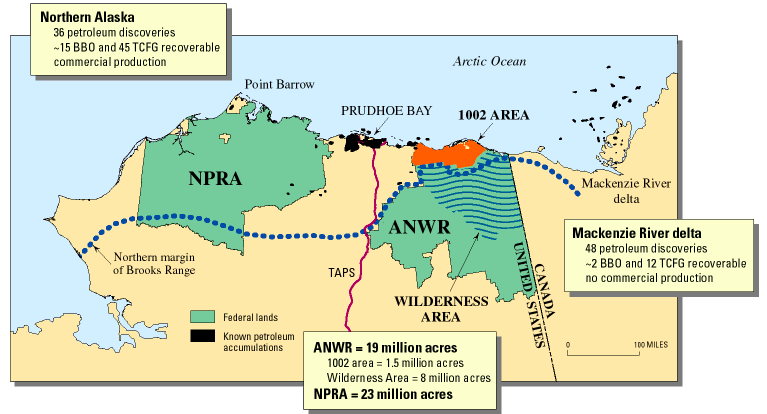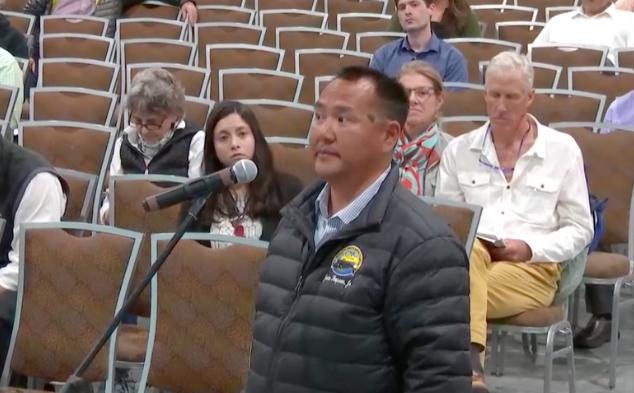IT’S ALL IMPORTANT, FEDS HEAR FROM ALASKANS
Wilderness is important. The Gwich’in people are important. The Inupiaq people are important. Caribou, indoor plumbing, whales, jobs, health, colonization, and rampant alcoholism. Even sex and the price of coffee.
It is all important and it was all was spoken into the federal record last night in Anchorage.
The opinions varied: Drilling in the 1002 Area of the Arctic National Wildlife Refuge will either bring death or destruction, or it will bring life, prosperity, revenue for the state, more stability for the Trans Alaska Pipeline, and more jobs.
In three-minute segments, dozens of Alaskans and a few Canadians stood at the microphone at the Dena’ina Center to address a panel from the Bureau of Land Management during the second “public scoping meeting” for an expedited environmental impact statement.
Some wore kuspuks, others were in “Alaska casual” business attire. Before them sat a panel of BLM officials, headed by Joe Balash, lifelong Alaskan and Assistant Secretary of the Interior.
NO-LEASE OR PRO-LEASE
The first stop had been in Fairbanks, where a similar hearing was held. There, the “no lease” crowd outnumbered the pro-lease crowd 50-1. Anchorage’s meeting was more balanced. There were the requisite protestors outside the Dena’ina Center before the hearing began, but no disruptions of the proceedings.
It was the exercise in modern governance, where proceeding on a project of any size includes the ability for opponents to protest and plead with regulators.
And so they did.
The ANWR argument has played out for decades between pro- and anti-development camps over a 22-million-acre portion of the coastal plain that is rich in oil.
The area is also rich in wilderness for a handful polyester-wearing outdoorsy types and their polypro kayaks. A desolate gravel-and-ice area of the Arctic, it is key to the life cycle of caribou.
The 1002 land has long been set aside for responsible oil development, but the environmental community has fought it for decades. Then, in December, the majority Republicans in Congress ordered that leases be opened for the coastal portion of the wilderness. The move was an historic victory for Sen. Lisa Murkowski, Sen. Dan Sullivan and Congressman Don Young. President Trump signed the legislation that made it so.

A SAMPLING OF THE TESTIMONY
A representative from the Wilderness Society told the panel, “The Arctic refuge is an amazing wild landscape of more than 19 million acres, and is home to polar bears, wolves, migratory birds, and the porcupine caribou herd, now numbering more than 200,000 animals. Oil and gas drilling would have devastating impacts on this pristine and fragile ecosystem because of the massive infrastructure that would sprawl throughout the coastal plain to extract and transport oil. Drilling the arctic is dangerous.”
A Gwitch’in representative said the refuge must remain untouched in perpetuity. Bernadette Dementieff called the government corrupt and said that two out of three Americans oppose drilling in the caribou calving grounds.
“It’s time that we start being heard and start listening to the American people and the First Nations of this country,” she said. “The people whose lives are forever going to change. The prices of food there [in the Arctic] are extremely high. It’s $20 for a can of coffee, $40 for a steak, three bananas are $12. We take care of ourselves, and that’s what our food security does for us.”
She continued, “You’ve been hearing from people from here in Anchorage talking about [how] they want drilling. But they’re the last people that will be affected. You need to listen to the people in the northern communities that are going to be affected, whose lives are going to change. I know your minds are made up, and some of you could care less and don’t even care about me or my people at all. But I will follow you to every meeting if I have to. You need to understand that drilling in the calving grounds of the porcupine caribou herd is a direct attack on the Gwich’in Nation and our culture and our way of life.”
Guides and wilderness pack rafters from Anchorage talked about the importance of preserving the area for tourism, and how many tourism jobs are created by wilderness.
Haley Johnston, a program manager for an adventure travel company, said she has traveled the refuge both for work as a guide and for personal trips.
“Annually, this sector employees over 72,000 people and contributes $7.3 billion to the state’s economy. Tour plays a huge role. According to the Alaska visitors statistics program, in summer 2016, over 1.8 million people visited Alaska. On average, each visitor spent $1,057 while in state.”
Brad Meiklejohn, speaking on behalf of the American Packrafting Association, said the refuge is a sacred wild place on a crowded planet and he has spent months there, exploring every river.
“The Arctic Refuge is a major reason that I live in Alaska. Members of the American Packrafting Association come from around the world to experience the Arctic Refuge. Many others never visit the refuge, but it’s important to them that it’s there. For me, and thousands of others like me, it’s our refuge,” said the aging adventurer who has spent much of his adult life in pursuit of touching untouched places.
“This story isn’t about caribou or oil. It’s about restraint. Restraint is an underrated virtue these days. Who could be against ease and comfort and convenience, bigger cars, and yet another strip mall lined with Jack in the Box and Home Depot? It’s hard to go against our base desires of greed and hunger, but we’re usually glad when we find the courage to say no,” he said.
That didn’t set well with one Native speaker, Glen Solomon of Kaktovik, which is in the 1002 Area. He faced the Gwich’in speaker at times during his remarks, and at other times turned and addressed the urban pack rafters and guides.

“Just to hear all these people talking about tourism, rafting down the river and everything, and you’re making a bunch of profit. I am not Gwich’in. This is where I’m from. This is where my ancestors were buried. This is where I was brought up. And just to hear the Gwich’in people trying to say that they are the caretakers of the ANWR, the Arctic National Wildlife Refuge, it’s where I’m from. The 1002 area is my land.”
For Solomon, another irony had not escaped him: “And just to have them [Gwich’in] try to develop back in the ’80s, they leased out 180,000 acres of their land for oil and gas development, and it was a bust. And just to have them try to put a stop to us developing on our own land, it just kind of stabs you right in the back. Because we would like to live like everybody else, get to have the resources to make profit, to make infrastructure in my village, to have jobs like everybody else, and just to have these people say,’ no, you can’t develop on your land’ — that hurts. That really hurts. That’s like stabbing somebody in the heart and saying you can’t live.
“I don’t want to live in a third world country. I have done that before. Getting honey buckets, spilling them into 55-gallon buckets growing up. Going, getting water. We got running water, we got flushed toilets, thanks to oil and gas. We got schools. We got clinics. It helps out a lot for our communities throughout the whole North Slope. And, you know, I love my people, I love my land, I love my animals. I’m a whaling captain. For the past three years, I have caught oil for my community to feed my people.”

Kara Moriarty, president of the Alaska Oil and Gas Association, spoke in favor of the project, as did Curtis Thayer, president of Alaska Chamber of Commerce, and Marleanna Hall, executive director of the Alaska Resource Development Council. They spoke of jobs and economic prosperity that energy development has brought the state, and that oil and traditional lifestyles are compatible. Technology improvements have shrunk the footprint of the projects in the Arctic and are protecting the land.
A Gwich’in man named David said he had been a North Slope worker for years and wasn’t impressed with jobs going to out of state to white people.
“You guys talk about revenue. You talk about jobs. You see all of these people that’s talking about working up a slope 30, 20 years, all these white people. Guess what, a lot of those people that work up there, they don’t even live in Alaska, they lived down the lower 48, so they make all that money, and they leave here. I work eight weeks out of the year, just enough to pay off my credit card. Why? Because the next 10 months, I don’t work.” That appeared to be something he felt worked well for his way of life.
Another Gwich’in man, Samuel John, said that the process had no respect for the Gwich’in people. He said when there is an economic collapse, the Gwich’in people will feed everyone on the BLM panel — but only if there are any caribou left.

State Sen. Cathy Giessel delivered a different perspective. She said the porcupine herd of caribou is thriving, not diminishing.
She summarized a study that documented the health of northern Alaskans from 1980 through 2014.
Describing the hard conditions of the villages she saw when she was a child, she relayed how the people on the North Slope have increased their life expectancy at the highest rate of anywhere in the United States since 1980 — an 8- to 13-year average increase for every person living there.
“We usually hear the typical oppositional outcry when projects like this are considered, that there will be devastation and destruction. But in fact, those things don’t happen. In fact, resource development has brought health and prosperity to Alaskans living in these areas, as well as the rest of the state,” Giessel said.
That wasn’t the experience from a young man from St. Paul Island. The man named George said, “When you bring oil to our lands, you also bring your people and your ways. And our women, our women are taken, and they are raped, drugs are brought to our children, and alcoholism plagues us due to these ways. You want to put oil in our lands, you put oil in us. What you do to our land is what you do to your women, and that is what is going on. Our women are getting raped as the land is getting raped.”

Speaker Roman Diall also got up into the sex analogy business in his remarks: “It’s like virginity, once it’s gone, it’s really gone.”
He continued, “But just because I have sex doesn’t mean I condone rape. The oil pad will only have, somebody said, like 1/100th a percent of the Arctic Refuge. Well, you know, would a father sell that 1/100th of a percent of his daughter’s skin that would command the highest price?”

This women-as-property moment is when Must Read Alaska checked out for the night. After all, the environmental impact process continues for the next several months and a piece of property needs her sleep.
